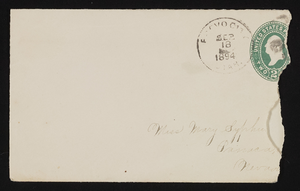Search the Special Collections and Archives Portal
Search Results
Cliff Olsen Professional Papers
Identifier
Abstract
The collection, 1949 to 2006, was compiled by Clifford Olsen, a containment physicist at the Nevada Test Site (NTS). It consists of research notes and working papers written by Olsen and other scientists, publications, epoxy aggregate samples, work-related correspondence, nuclear-test-event data, and interviews conducted by Olsen with work colleagues involved with the NTS.
Archival Collection
Gay and Lesbian Community Center of Southern Nevada Records
Identifier
Abstract
The Gay and Lesbian Community Center of Southern Nevada Records (1992-2023) and include news articles, institutional records such as bylaws, agendas, and meeting minutes, ephemera, and programs for the Center’s annual Honorarium fundraiser. Additional materials include materials relating the the wellness clinic.
Archival Collection
Desert Fishes Council Records
Identifier
Abstract
The Desert Fishes Council Records (1969-1988) consist of resolutions, meeting minutes, symposium programs, agendas, and press releases of the Desert Fishes Council (DFC). The organization is devoted to the study and preservation of Southwestern desert fishes, notably the desert pupfish. The DFC records reflect efforts to bring the plight of desert fishes to the attention of academics and the public as well as highlight the worth of desert lands within the American environmental movement.
Archival Collection
Julian Taber Collection on Gambling Addiction
Identifier
Abstract
The Julian Taber Collection on Gambling Addiction (1977-1988) includes papers, proposals, internal reports, memoranda, and newspaper articles chronicling the work of Julian Taber, an early specialist in the field of gambling addiction. The majority of the collection relates to Taber’s work and pilot programs at the Brecksville Veterans Administration (VA) Hospital in Brecksville, Ohio, with select materials pertaining to an alcohol dependency treatment program he coordinated at the VA hospital in Reno, Nevada.
Archival Collection
Las Vegas High School Class of 1929 Collection
Identifier
Abstract
The Las Vegas High School Class of 1929 Collection (1921-1979) contains materials relating to the Las Vegas High School graduating class of 1929. Materials include a scrapbook with photographs, pamphlets, fliers, and newspaper clippings from the thirtieth, fortieth, forty-fifth, and fiftieth reunions, as well as poster boards and oversized photographs from the 1920s.
Archival Collection
Elmer R. Rusco Collection on Ethnicity and Race in Nevada
Identifier
Abstract
The Elmer R. Rusco Collection on Ethnicity and Race in Nevada (1964-1972) contains correspondence, court cases, employment information, and research materials compiled by Rusco for a book he was writing on race relations in Nevada.
Archival Collection
Jane Ham Legislative Papers
Identifier
Abstract
The Jane Ham Legislative Papers (1980-1981) document the legislative activities of Nevada Republican Assemblywoman Jane Ham during the 1981 legislative session. The collection consists of Legislative Bureau correspondence, memos, pamphlets, and draft legislative bills. Also included are reports, studies, and informal polls from private individuals and lobby groups expressing response to pending legislation.
Archival Collection

Letter and envelope from Annie Rannow, Provo City, Utah to Mary Etta Syphus, Panaca, Nevada
Date
Archival Collection
Description
From the Syphus-Bunker Papers (MS-00169). The folder contains an original handwritten letter, an envelope, a typed transcription of the same letter, and a copy of original letter attached.
Text

Chris Davis, Debbie Davis, and Mynda Smith oral history interview: transcript
Date
Archival Collection
Description
Oral history with Chris Davis, Debbie Davis, and Mynda Smith conducted by Claytee D. White and Barbara Tabach on May 24, 2018 for the Remembering 1 October Oral History Project. In this interview, Debbie and Chris Davis and Mynda Smith discuss the murder of their daughter and sister (respectively), Neysa Davis Tonks, at the Route 91 Harvest Country Music Festival on October 1, 2017. They discuss plans to form Fifty-Eight Loved and Never Forgotten, a foundation to help educate the children of the 58 families affected that night. Neysa, a single mother, left behind three sons, 24, 18, and 15 years of age. The family members recall how they were first alerted to Neysa's death, and having to locate and identify her body at the coroner's office twenty-four hours later. Chris, David, and Mynda reflect on Neysa's life, her work, and legacy. Debbie, Chris, and Mynda believe that "darkness cannot exist in the presence of light. Neysa's light will shine forever."
Text

John Fudenberg oral history interview: transcripts
Date
Archival Collection
Description
Oral history interviews with John Fudenberg conducted by Barbara Tabach and Claytee D. White on May 3, 2018 and May 23, 2018 for the Remembering 1 October Oral History Project. In this interview, John Fudenberg, the coroner for Clark County in Las Vegas, Nevada, gives an account of his experience during the October 1, 2017 mass shooting on the Las Vegas Strip and what his role was during the tumultuous days after the shooting. He explains how he and the staff of the coroner's office prepared for the large number of casualties as well as their arrival at the Route 91 Harvest festival venue. Fudenberg speaks of setting up the Family Assistance Center at the convention center and how it supported the community but also aided the coroner's office in gathering information about the deceased and identifying them. Fudenberg discusses the main job of the Coroner's Office during the first week after the shooting, which was to autopsy the bodies and communicate with the families, as well as the Police Department. He also talks about the emotional impact the shooting and its aftermath had on him and his staff members and the wellness program they implemented, of which trauma yoga and meditation had a large impact.
Text
